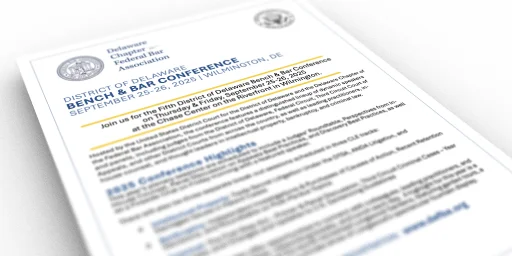
An order on Friday reminded me of a local counsel issue that comes up from time to time here in D. Del.
Whenever a party files a motion or a brief, the docket on PACER automatically includes a due date, like so:
312 OPENING BRIEF in Support re 311 MOTION to Amend Judgment, filed by ViaTech Technologies Inc..Answering Brief/Response due date per Local Rules is 11/8/2023. (Mayo, Andrew) . . . (Entered: 10/25/2023)
ViaTech Technologies, Inc. v. Adobe Inc., C.A. No. 20-358-RGA-JLH (D. Del. Oct. 25, 2023).
The docket text is not perfectly clear, but that due date is automatically generated based on a set of rules in PACER (that are intended to mirror the local rules). It's not binding, even if some court staff occasionally treat it as significant. But, most importantly, it's not always right.
In fact, in practice, it feels like it's wrong almost as often as it's right.
On Friday we saw the Court correct the due date for an order on the docket:
CORRECTING ENTRY: The briefing schedule set on 10/27/2023, regarding the motions filed at D.I. 315 and 316 has been removed as it was entered in error. Further, the docket text for D.I. 312 has been amended to remove the Answering Brief/Response due date set per the Local Rules. The order at D.I. 310 controls the schedule for the motions. (nms) (Entered: 10/27/2023)
Id. (Oct. 27, 2023).
In short, the parties had filed a stipulated briefing schedule, and when they filed their—as always—the Answering Brief/Response date was incorrect, because it didn't reflect the agreed schedule.
In this rare instance, the Court corrected the date on the docket. But the vast majority of time, the Court does not (how could it, really?), and it's up to the parties to know the deadlines.
This issue comes up with fair frequency, and in both directions—with the automatic PACER deadline set before or after the real deadline. Here are a few examples:
- Motions to amend or strike. The judges often have their own procedures for these that have their own abbreviated deadlines. If you rely on the automatically-generated PACER deadline, you might miss your deadline to respond.
- Stipulated briefing schedules. These can be longer or shorter than the default dates, but the important thing to remember is that the automatic PACER date is meaningless here. The stipulated deadline controls.
- Scheduling order briefing schedule. Same as above. Parties often set briefing schedules in the scheduling order for things like claim construction and summary judgment/Daubert motions. PACER and CM/ECF don't take into account dates set in the scheduling order.
- Transcript redaction deadlines. The deadlines PACER gives are inconsistent with the Court's transcript redaction policy.
Beyond including sometimes-incorrect deadlines, PACER also doesn't mention a number of deadlines. This is particularly true when it comes to redacting filings or sealed opinions, and deadlines for requesting or argument or for certain filings in the lead up to trial.
I still like to have the automated deadlines. But it's important to understand what it's doing and what it's not doing, and that it's not something you can blindly rely on.
If you enjoyed this post, consider subscribing to receive free e-mail updates about new posts.





